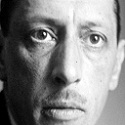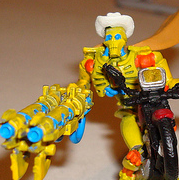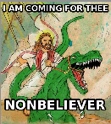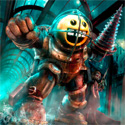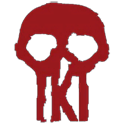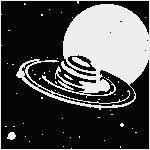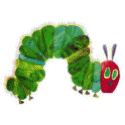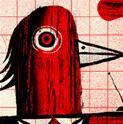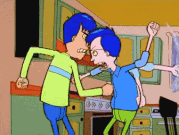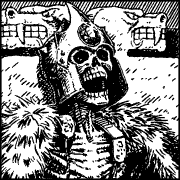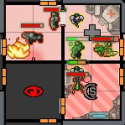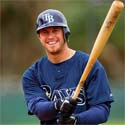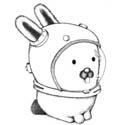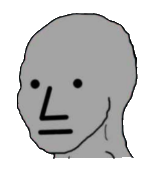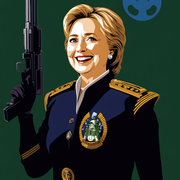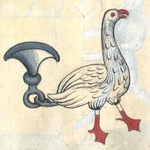|
Ok that explains why you thought the majority of the book was pointless then. If you are ever willing to give it another shot get a copy with annotations in it (the Pevear and Volokhonsky version is pretty good) so that you can pick up on some of the things you missed due to well, not living in the USSR during the time depicted. Its a pretty funny story of how the devil comes in and causes havoc most people do not realise because most of the havoc is similar to their daily lives (people vanishing was not that uncommon due to secret police for example).
|
|
|
|

|
| # ? May 15, 2024 04:51 |
|
Annotated editions are great, but also check out essays and other such materials that are available on the internet. This stuff is usually short and immediately illuminating, and that's what I do when feeling like I'm missing something. After doing that you'll likely want to read it again, and plus that'll give you an understanding of how to approach good literature in general, if you dont have that already. thoroughly annotated books always give me a kind of a heavy impression. I have this back-translated Japanese annotated Moscow - Petushki, and it's completely indulgent, like explaining what a glass is. As for motivation and sudden inexplicable changes in characters, I haven't read the novel in question in years, but it's probably the same issue some people have with some of Chekhov's works, in fact it's something critics of his time struggled with as well. It's that an author may choose not to describe every step in a character's evolution, making you wonder what happened in their head to make them act in a given manner, making you think. So, naturally if you don't keep track of their thoughts and actions you'll feel puzzled, unsatisfied. Besides all that, make sure to take the author's politics into consideration, the book's main conflicts, and how the events in the book relate to those and to whatever is happening with characters. Not sure what the rules are, so, I am currently in the middle of Turgenev's On the Eve and a bunch of other similar things.
|
|
|
|
Hooooooooooooly shiit. Forgot about this. Went a while without reading because of stuff, but found time to do some now that it's middle of summer.Blind Sally posted:7 1/2. Coraline: The Graphic Novel - Neil Gaiman et al. 9. Saga - Brian K. Vaughan I actually read a bunch of these trades earlier in the year. I remember enjoying them and digging the artwork, but I honestly can't remember much of what happened in them, so, uh, I guess that's ultimately a knock against them. 10. (Rat Book?) -??? I lost my list of books I read and feel silly now. This was an informative, if not scholarly, book about rats. Some Canadian journalist (from Ontario?) discovered a fascination with rats and started studying them and interviewing people knowledgeable of them. Interesting stuff in them, and an easy read. Damned if I can remember the proper title. It was "Rat" and had a subtitle. I tried searching it but, well, searching for "rat" didn't get me anywhere. 11. To Bear Any Burden - Al Santoli Holy crap, what a crushing read. This took forever to get through. Not because it was poorly written, but because it was so soul-crushing. Santoli basically gathers the stories of people involved in the Vietnam War and prints them. However, it's not just soldiers, and it's not just Americans. There are stories from the South Vietnamese, the North Vietnamese, Cambodians, Americans, teachers, soldiers, politicians, generals, Viet Cong guerrillas, foreign aid workers--the scope is incredible. It's also pretty drat brilliant at giving an idea at just how much of a cluster gently caress the whole situation was. Not as powerful as Baker's Nam or Herr's Dispatches, but a stronger book for its depth and scope. 12. They Called Me Number One - Bev Sellars This is a memoir written by Xat’sull Chief Bev Sellars about her time in residential school. If you're unfamiliar with them, residential schools were basically Canada's attempt at genocide of the First Nations living there. Children were forcefully taken from their families, denied their language and culture, and indoctrinated with Christians teachings. Children were beaten, starved, and abused. It runs deeper than that, but it was an absolutely foul historical event that really doesn't get as much attention as it should considering the last residential school didn't shut down until 1996. Anyways, yeah, Sellars' memoirs are tragic and touching, highlighting the devastation these schools inflicted while giving hope for the future and her own healing. Highly recommend this. 13. The World's Strongest Indian - Sherman Alexie I love Alexie. Straight up. I was waiting in the library for my friend and picked this up off the shelf. Only a few pages into the first short story and I was hooked. I finished half the book while sitting there. I always keep telling myself to read more Alexie, and this collection reminds me why. His stories are at once surreal nightmares and heartwarming dramas. His ability to evoke laughter, anger, and sadness within the breadth of a few paragraphs is incredible, and he does it all without it feeling unnatural or cheap. Basically, this book is just a collection of short stories involving Spokane First Nations living their life in modern America, but really, they're some of the most powerful stories I've read in a long time. 14. Memoirs Found In A Bathtub - Stanislaw Lem Not my favourite work by Lem. It's basically a long indictment of Cold War paranoia. It's funny in a lot of places, and reminded me of Terry Gilliam's Brazil throughout much of it (though Memoirs came first, I saw Brazil first). It does drag on in places and become a bit tedious with the descriptions of mindless bureaucracy, but ultimately, that's the point, so I can't really fault it. The best parts, as always, are the characters who philosophically muse on their existence. Worth the read, but honestly, I thought the opening framing device was the most entertaining bit. 15. & 16. The Chrysalids & The Day Of The Triffids - John Wyndam I've never read any of Wyndam's stuff, so this was me just catching up on some old books. I enjoyed them both, and they weren't at all what I expected. I honestly thought Chrysalids was going to be about old people trying to live forever, though I guess I was just thinking about Cocoon starring Wilfred Brimley. And I guess I expected more of an Invasion Of The Body Snatchers kind of deal with Triffids. Ah well, they were fun.
|
|
|
|
Oh yeah, and-- 17. The Name Of The Wind - Patrick Rothfuss This book stunk. It had some high points, but it was mostly padding and self-congratulating courtesy of the most obnoxious protagonists I've read about in a long time. Holy crap is Kvothe or Quothe or whatever the gently caress his name insufferable. I'm so upset at my friends for recommending this to me. I was so upset to find out that this book was basically an extended prologue and that most of the stuff mentioned in the book's jacket don't actually occur.
|
|
|
|
51) The Butcher of Khardov by Dan Wells Picked this one up because I'm interested in the setting and it was Hugo-nominated. I liked it. It's the tale of how the character from the game came to be the monster he is. Its solid characterization and the author's use of non-linear storytelling managed to keep it interesting throughout. 52) All Quiet on the Western Front by Erich Maria Remarque I thought it was a powerful work, but nothing I write here would really do this book justice. 53) Chekov's Enterprise: A Personal Journal of the Making of Star Trek, the Motion Picture by Walter Koenig Look at that, I managed to find a Star Trek book that was non-fiction. This was an enjoyable and insightful look into the production of the first Trek movie from Koenig's unique point of view. The day to day journal entries are often funny in their descriptions of the goings on of Soundstage 9. 54) Suffering Succotash: A Picky Eater's Quest to Understand Why We Hate the Foods We Hate by Stephanie V.W. Lucianovic The first half of this book is really interesting. The author contacted a lot of specialists to understand the science behind why we like (and don't like) the things we eat (and don't eat.) It's informative and the author's style is light and often funny. The back half of the book dragged a bit once it moved from the science part into the personal blog part. 55) ReVisions by Julie E. Czerneda (Editor/Contributor) I've always been a big fan of "What if?" stories, and the editor has assembled a great collection here. That brings my running total to 52.5/100.
|
|
|
|
Blind Sally posted:Oh yeah, and-- I have been recommended this book as well. However, I have been warned that the main character is insufferable and the entire novel is actually junk. The motivation to read this is to see how absurd acquaintance of mine is for identifying with the main character (his name is Quothe? Really? Ugh.) and boasts about it. The arrogance is palpable. With that in mind, I feel compelled to read it.
|
|
|
|
thespaceinvader posted:46: Tuf Voyaging is more of a short story collection, but really, surprisingly good. I enjoyed it a lot. Well-thoguht-out ecosystems, interesting characters with interesting problems and imaginative solutions. And altogether more... optimistic than I expected from GRRM. Well worth reading. In the process of doing so I also found out that apparently GRRM invented D&D's Githyanki. Who knew? 47: The Forge of God by Greg Bear. Love humble bundle ebooks generally. I enjoyed this, but it felt a bit... slow. It was much more of a character study book than I'm used to reading, and i kept just... wanting something more to happen. It felt a little dull. Might pick up the next one, not sure. 48: Blackcollar by Timothy Zahn. Not read Zahn since Thrawn, but so far it's good fun. Trek Junkie posted:(his name is Quothe? Really? Ugh.)
|
|
|
|
Trek Junkie posted:I have been recommended this book as well. However, I have been warned that the main character is insufferable and the entire novel is actually junk. The motivation to read this is to see how absurd acquaintance of mine is for identifying with the main character (his name is Quothe? Really? Ugh.) and boasts about it. The arrogance is palpable. With that in mind, I feel compelled to read it. Within the first page of the Patrick Rothfuss thread, unsatisfied goons had adequately summed up my problems with book. Ultimately, yeah, Rothfuss isn't a terrible writer, but he's not a great one either, so I'm not really stoked on reading extended passages of his prose. I truly feel the book would have been better served if it was more heavily edited and I resolved/introduced more of its advertised plot elements.
|
|
|
|
thespaceinvader posted:47: The Forge of God by Greg Bear. Love humble bundle ebooks generally. I enjoyed this, but it felt a bit... slow. It was much more of a character study book than I'm used to reading, and i kept just... wanting something more to happen. It felt a little dull. Might pick up the next one, not sure. The only Greg Bear I've read was the novel Eon and it's prequel, and those were definitely on the slower side of things (especially the prequel).
|
|
|
|
thespaceinvader posted:
Is the name contextually relevant? Or, it is simply for the sake of douchebaggery? Blind Sally posted:Within the first page of the Patrick Rothfuss thread, unsatisfied goons had adequately summed up my problems with book. Ultimately, yeah, Rothfuss isn't a terrible writer, but he's not a great one either, so I'm not really stoked on reading extended passages of his prose. I truly feel the book would have been better served if it was more heavily edited and I resolved/introduced more of its advertised plot elements. It is difficult for me to understand why someone would provide a summary that doesn't reflect the actual plot of the book. I like to imagine that Rothfuss wrote a summary for The Name of the Wind only to realize that he, in fact, wrote a completely terrible novel and then wrote another, false summary, in order to turn a profit. 
|
|
|
|
Stupid_Sexy_Flander posted:84: Good Omens - Terry Pratchett/Neil Gaiman 106: Critical Failures - Robert Bevan 107: Critical Failures 2 - Robert Bevan 108: d6 - Robert Bevan 109: 2d6 - Robert Bevan 110: Unrelenting Terror - P.S. Power 111: Nightfall - Stephen Leather 112: Midnight - Stephen Leather 113: Nightmare - Stephen Leather 114: Riddle in Stone - Robert Evert 115: The Omega Project - Steve Alten 116: Redemption Song - Craig Schafer 117: The Long Way Down - Craig Schafer 118: Kumquat - Jeff Strand 119: A Snake in the Grass - K.A. Stewart 120: Spirit's End - Rachel Aaron 121: I Am Legend - Richard Matheson 122: Gorgon - Greig Beck 123: Mercury Revolts - Robert Kroese 124: Clovenhoof - Heide Goody/Iain Grant 125: The Forever Man - Pierre Ouellette Critical Failures/2/d6/2d6 are all the same sort of story set in the same world. Basically, role playing guys get trapped in a D&D style game and have to figure out how to get out, and have adventures in the mean time. They are sophomoric, filled with horrible jokes and a half orc making GBS threads himself constantly, but they are also god damned hilarious. Well worth a read if you want funny in your D&D. Unrelenting Terror sucked balls. It was just flat out horrible. The entire premise of the book was retarded, and it fell COMPLETELY short of the build up of the description. It's supposed to be a horror book that makes you feel haunted, but all it is ends up being just a slag through some dumb b movie grade bullshit that peters out like a penny bottle rocket. Nightfall/Midnight/Nightmare is a self contained series about a guy who keeps getting told he's going to hell, and surprisingly there ends up being demons and satan worshippers involved. The first book is fairly decent, but the others just repeat the same story, and when the whole shebang ends it just literally leaves tons of plot holes open. I can't recommend it unless you are REALLY hard up for some light urban fiction/horror based out of London. Riddle in Stone is the story of a scholar librarian dude who leaves his village and tries to do a treasure hunt but gets hosed up by goblins. There's more to it than that, and while it was kinda nice reading about the hero of a fantasy novel that WASN'T Fabio in a loin cloth, the book kinda ended up just being "meh". It had good points and bad points, and it was decent enough for me to start reading the sequel. Just sorta... hell I guess "Unique" is the best term I can use for it. The Omega Project was also rear end. He somehow took a plot point of "asteroid smashes into planet, causes widespread extinction" and turned it into a weird liberal rant about politics, and made the main character a jew who will never stop letting you know that he is, in fact, of the jewish persuasion and also this is an important plot point because he's a jew. I mainly kept reading to see how far the rabbit hole went, and it went straight down into a shithole. Let my pain mean something and just avoid this book altogether. Long Way Down/Redemption Song are the first 2 books in a new urban fantasy series, and surprisingly it's pretty damned good. I took a chance on the first book, but after I finished reading it I went ahead and bought the second. It's actually a great read. Surprisingly, considering a succubus is one of the main characters, there is very little sex in the book and it isn't a weird "This is really porn, but we call it a book because if Anita Blake can have a series so can I" sort of novel. I'm not against sex, I'm just against it when it's not written well, and unfortunately in this genre most authors can't. Starts out a little rough but by chapter 3 I was hooked. Kumquat, weirdly enough following that rant, is a romance novel. It's actually really good. It surprised the gently caress out of me. I love the author's other work like Wolf Hunt and the Andrew Mayhem series, but this is a complete chance of pace. It handles the emotional roller coaster of what relationships start like, the weird feelings, the awkward moments and the general bliss of falling in love amazingly well, while keeping the story interesting enough to read with bad poo poo happening to the main character as is the norm for most of Strand's work. A Snake in the Grass was decent. Not terrific, not bad. If you are a fan of the series you will probably dig it. If you've never read the series about a guy who sword fights demons to make them give up their contracts for human souls, this book will not sell you on it. Read the first two. If you still like it, keep on reading. This basically just sort of sets up a subplot and builds up a longer story. Spirit's End is awesome. A reread from last year, but I really do love the series. Great end to it. I Am Legend was ok. WWWAAAAYYYY better than that poo poo movie they made out of it, but wow this book did not age well. Still, it's a classic. Gorgon was awesome. I love this series, and while this isn't "Crazy Iranian President sending muslims through a black hole to meet Allah" levels of batshit, it was fairly crazy. If you are a fan of this series you will love it. Mercury Revolts was pretty good. It's set in the middle somewhere with no specific time like "3/4 of the way through book 1, a side adventure". Basically it's Mercury in the American Revolution and all the wonderous joy that can bring in novel format. Clovenhoof was an odd duck. It tried to be Good Omens, but it wasn't QUITE good enough. Basic idea is that the devil is kicked out and fired from his job for sub standard management, and has to deal with living on earth as a human. Crazy poo poo ensues, and basically that's it. The plot meanders around a bit, but overall it's a decent read. The Forever Man - Got this as an EARC, and couldn't review it till it came out. It's a fairly decent book. A little weird on the premise, but the overall idea is this guy learns how to basically end up being immortal with some help, and the protagonist's brother is one of those ways. It's a bit of a mystery meets sci fi meets just weird poo poo, but overall it's pretty decent. Could be better, could be worse. Overall recommendations for the month are the Critical Failures series, Kumquat, and The Long Way Down/Redemption Song and Gorgon.
|
|
|
|
screenwritersblues posted:29) Lost and Found: Stories from New York Edited by Thomas Beller I don't think that I'm going to finish anything else this month, so here's July 30) Going Clear: Scientology, Hollywood, and the Prison of Belief by Lawrence Wright: I've been waiting a while to grab this book, because of the fact that I didn't want to drag around a massive hardcover. I loved this book and it really opened my eyes to how bad Scientology is and how easy it is to get sucked into it. 31) The Bobby Gold Stories by Anthony Bourdain: I really wish that this was more of a fictional story about a chef instead of a mob member, but it was still really good. I heard Bourdain's voice as I read it. 32) The Rules of Attraction by Brett Easton Ellis: Years ago, when my father finally upgraded the cable box to something that was a lot more modern, we had showtime for the first time ever. The the movie adaption of this book was one of the first things that I watched and I was blown away by it. I read the book and was blow away be how close it was to the film itself (Note: this was the first time that I've read the book after seeing the movie, so I was kind of amazed how close it was to the film). 33) Paper Towns by John Green: John Green is the author version of Cameron Crow. 34) What I Was Doing While You Were Breeding by Kristen Newman: I picked this one up on a while and I was really glad that I did. I went into it blind, not knowing anything about the author. While a lot of people over in the what did you just buy/begin thread said that the author seemed "insufferable," she really wasn't and just wanted to see the world. 35) The Blazing World by Siri Hustvedt: I got this book from Powell's Indenspensable program, which every six weeks they send me a book and a few other things. This book was pretty good, but pretty confusing because of the way that it was written. Going inbetween journals, interviews and other things, made me lose interest. But I finished it anyway. Goal to for the year: 30/30 35/30 Currently reading: We Are Not Ourselves by Matthew Thomas. The book itself doesn't come out for another three weeks, but I got it as an advanced copy from the Indenspensable program. I'm hoping that it's good because of the fact that it's already on everyone's list for a must read book.
|
|
|
|
1. Dust of Dreams by Steven Erikson 2. Vulcan's Forge by Josepha Sherman and Susan Shwartz 3. Harbinger by David Mack 4. The Crippled God by Steven Erikson 5. Consider Phlebus by Iain M. Banks 6. Masters of Doom by David Kushner 7. Summon the Thunder by Dayton Ward 8. Blood and Bone by Ian Cameron Esslemont 9. Player of Games by Iain M. Banks 10. The Lies of Locke Lamora by Scott Lynch 11. Reap the Whirlwind by David Mack Blood and Bone was fine, Player of Games kicked rear end, Lies of Locke Lamora kicked an incredible amount of rear end, and Reap the Whirlwind was pretty dull. Lamora was so good I'm strongly considering reading the others in the series, despite hearing mixed things about em. I don't want to get ahead of myself, but I think I'm on a pretty good pace so far this year. Much better than last year. Pretty optimistic about finishing my goal. 
|
|
|
|
thespaceinvader posted:48: Blackcollar by Timothy Zahn. Not read Zahn since Thrawn, but so far it's good fun. Next will be one of the Humble SF bundle books, but not sure which.
|
|
|
|
I forgot to update in June, so here's two month's worth of bookreading. 29 - 31. The Swords of Lankhmar, Swords and Ice Magic, and The Knight and Knave of Swords by Fritz Leiber finished off the series. Book 5, The Swordsof Lankhmar, was great. While the others in the series were collections of short stories, book 5 was a singular tale and was better for it. The final two collections followed a similar strategy but, unfortunately, were less interesting in their telling. I found Leiber's attempt to ease his heroes into retirement was generally uninteresting, and the series ended with a whimper. 32. The Yiddish Policemen's Union by Michael Chabon surprised me. The jacket descriptions did not make it sound like a novel I'd like to read, but it was ultimately pretty fantastic. While generally straightforward and clear, Chabon's prose occasionally veers into wonderfully succinct poetry. I just wish I had baseline understanding of Yiddish, as his use of Yiddish slang (which I had to look up) was wry and humourous. Sholem (Peace) instead of gun, and Shofar (Horn) for phone were two notably fitting examples. Pretty great. 33. Bad Little Girls Die Horrible Deaths and Other Tales of Dark Fantasy by Harry Connolly was a short story collection from the Twenty Palaces author. It's a mix of experimental fantasy writing and Twenty Palaces tales from various times in his career. While not all fantastic, I can't think of a single story that I didn't like. The proto-Twenty-Palaces short was particularily great, and it was fun to read fantasy writing in Connolly's voice. 34. The Rhesus Chart by Charles Stross was more of what I'd come to expect from the Laundry Files. So, pretty fun. 35. Roadside Picnic by Arkady and Boris Strugatsky was imaginative and bleak. And also great. It's been a great month. 36. Three Parts Dead by Max Gladstone surprised me with his urban tale of lawyer liches arguing contract law over the recently deceased body of a fire god. I liked it. 37. Crack'd Pot Trail by Steven Erikson advertised itself as a novella featuring the authors favorite vile necromancers. What it delivered was an unsubtle, biting satire and examination of the relationship between artist, art, and audience. It was great, but not in the way I expected. In the novella, a dimwitted audience expects and demands specific things from the artists in their caravan, devouring them for dinner should they not deliver. Some reviewers of Crack'd Pot Trail absolutey hated it for not being Malazan enough, inadvertently making Erikson's point for him.
|
|
|
|
Siminu posted:32. The Yiddish Policemen's Union by Michael Chabon surprised me. The jacket descriptions did not make it sound like a novel I'd like to read, but it was ultimately pretty fantastic. While generally straightforward and clear, Chabon's prose occasionally veers into wonderfully succinct poetry. I just wish I had baseline understanding of Yiddish, as his use of Yiddish slang (which I had to look up) was wry and humourous. Sholem (Peace) instead of gun, and Shofar (Horn) for phone were two notably fitting examples. Pretty great. My copy had a glossary in the back for this stuff (which I didn't find until I finished it
|
|
|
|
July: 25. Forbidden Colours (Yukio Mishima) 26. Catch-22 (Joseph Heller) 27. One Hundred Years of Solitude (Gabriel Garcia Marquéz) 28. On the Road (Jack Kerouac) 29. Our Band Could Be Your Life: Scenes from the American Indie Underground, 1981-1991 (Michael Azerrad) 30. Life and Death are Wearing Me Out (Mo Yan) 31. The Sound of Things Falling (Juan Gabriel Vásquez) Between a power cut and Chrome making GBS threads itself I've retyped commentaries on these twice already and I can't really face doing it again. Suffice to say that I loved this month and everything I read. Catch-22 was the best and I should have read it years and years ago. It's an amazing book and that Heller quote about him being told he'd written nothing better since and him replying "Who has?" sums it up pretty perfectly. That's not to take anything away from the rest, though. A really excellent month. With five months to go and goal in sight I'm going to push it up again and stretch to 60. Meta-goals up to 8 and 8, no change for non-fic because I have tons of novels to get through and I'm trying to concentrate mostly on reading what I've already bought instead of buying more. Next up is Dance Dance Dance by Haruki Murakami. Year so far: 01. The Ragged Trousered Philanthropists (Robert Tressell) 02. Always Managing: My Autobiography (Harry Redknapp) 03. Things Fall Apart (Chinua Achebe) 04. Hyperbole and a Half: Unfortunate Situations, Flawed Coping Mechanisms, Mayhem, and Other Things that Happened (Allie Brosh) 05. Dracula (Bram Stoker) 06. The Drowned World (JG Ballard) 07. The Tudors: The Complete Story of England's Most Notorious Dynasty (G.J. Meyer) 08. Wolf Hall (Hilary Mantel) 09. The Politics (Aristotle) 10. The Prince (Niccolo Machiavelli) 11. Twelve Years a Slave (Solomon Northup) 12. The Fault in Our Stars (John Green) 13. If on a winter's night a traveller (Italo Calvino) 14. The Communist Manifesto (Karl Marx & Friedrich Engels) 15. The Age of Revolution: 1789-1848 (Eric Hobsbawm) 16. The Sailor Who Fell From Grace with the Sea (Yukio Mishima) 17. The Fall of Paris: The Siege and the Commune 1870-71 (Alistair Horne) 18. The Handmaid's Tale (Margaret Atwood) 19. Homage to Catalonia (George Orwell) 20. Half Blood Blues (Esi Edugyan) 21. The Ottoman Empire: The Classical Age 1300-1600 (Halil Inalcik) 22. The Outsider (Albert Camus) 23. The Ottoman Empire: The Structure of Power 1300-1650 (Colin Imber) 24. Suleiman the Magnificent (André Clot) 25. Forbidden Colours (Yukio Mishima) 26. Catch-22 (Joseph Heller) 27. One Hundred Years of Solitude (Gabriel Garcia Marquéz) 28. On the Road (Jack Kerouac) 29. Our Band Could Be Your Life: Scenes from the American Indie Underground, 1981-1991 (Michael Azerrad) 30. Life and Death are Wearing Me Out (Mo Yan) 31. The Sound of Things Falling (Juan Gabriel Vásquez) Total: 31/60, 4/8 women, 6/8 non-white people, 13/20 non-fiction
|
|
|
|
elbow posted:June - 43/52 July - 48/52 44. 1001 Books You Must Read Before You Die. Yes, I actually read/skimmed all of it and kept a list of titles I want to check out. I don't know why I did it, it wasn't enjoyable at all, and it's not like I'm running out of books to read, either. 45. The Postman, by David Brin. This started out so well and had such a promising story, but the rampant sexism and explosion of testosterone in the last third of the book really ruined it for me. 3/5 46. Ubik, by Philip K Dick. What a complete mindfuck -- in the best sense. 4/5 47. The Underwater Welder, by Jeff Lemire. I love Jeff Lemire, I love graphic novels, I love things like The Twilight Zone. I love this book. 5/5 48. Horns, by Joe Hill. I really enjoyed the first half of the book, particularly the confessions people started making, but for some reason got incredibly bored after that. I wish Hill had made the antagonist a bit more complex. I know that's not easy to do with a psychopath but I think Hill went overboard here. 3/5
|
|
|
|
July! 76. The Pickwick Papers - Charles Dickens 77. Wizard and Glass (Dark Tower #4) - Stephen King 78. Pow! - Mo Yan 79. The Rise and Fall of Great Powers - Tom Rachman 80. The Wolves of the Calla (Dark Tower #5) - Stephen King 81. The Leopard - Giuseppe De Lampedusa 82. Unseen Academicals - Terry Pratchett 83. Song of Susannah (Dark Tower #6) - Stephen King 84. The Ground Beneath Her Feet - Salman Rushdie 85. Crime and Punishment - Fyodor Dostoevsky 86. Boy, Snow, Bird - Helen Oyeyemi 87. Preludes and Nocturnes (Sandman #1) - Neil Gaiman 88. The Dark Tower (Dark Tower #7) - Stephen King 89. Roadside Picnic - Boris & Arkady Strugatsky This was a mostly unimpressive month, though I read a lot. Crime and Punishment was probably the highlight, as I’d never read it in the Pevear & Volokonsky translation - I’d read the Constance Garnett translation years back and found it difficult, but this was great and now I’m looking into reading more of Dostoevsky’s stuff beyond this and Brothers Karamazov. Wizard and Glass is pretty much the best Dark Tower book, though it’s barely about the main story; it’s a close tie between that and the previous book, The Waste Lands. The three that come after… well, they’ve got their moments, but they’re a step down. There are great moments interspersed with annoying, stupid stretches. The Ground Beneath Her Feet was my most recent return to Salman Rushdie, who burned me a bit last year with his lame autobiography. Reading this brought back all the reasons I enjoyed him - clever wordplay, freewheeling plots that come together nicely - and I liked his alternate version of the world, and wish I could have heard his fictional band. It’s not his best work, but it’s a lot of fun. Finally, I finished the month with Roadside Picnic, an excellent Russian sci-fi novel from the 70s. I really enjoy how concise early sci-fi can be, as opposed to the bloated sagas that later came along in the genre.
|
|
|
|
76 - Mira Grant - Deadline. The sequel was better than I was expecting. I might have to read the third at some point. 77 - Brian Keene - The Conqueror Worms. You would think a story about massive man-eating earth worms would be awesome. Evidently not when Brian Keene writes it. 78 - Jim Butcher - Skin Game. It's pretty much more of the same and I am okay with that. 79 - John Ajvide Lindqvist - Little Star. Nothing like the back of the book. Dark, creepy and intellligent. Perhaps my favorite read of the summer so far. 80 - Michael Connelly - The Black Ice. Run of the mill mystery/thriller. 81. Clive Cussler- Poseidon's Arrow. My first Cussler book. It was fun. But Cussler might me the sort of thing I read when I run out of other options. 82 Timothy Zahn - Heir to the Empire. Read this when I was in fourth grade and it changed my world. Rereading it now, it was just okay. When there was nothing but 3 Star Wars films it was a revolution, now it's just another Star Wars story. 83 Jeff Strand - Graverobbers Wanted: No Experience Necessary. I comedy horror novel. While entertaining, it's a little too silly to be great. 84 Harlan Coben - Six Years. If you've ever read any Harlan Coben novel before, then you've read this one. 85 Jeff Strand - Single White Psychopath:Seeks Same. Another comedy horror novel. While entertaining, it is a little too silly to be great. 86 Alex Kotlowitz - There Are No Children Here. An amazing look into the lives of people (particular children) living in the projects in the late 80s. Heartbreaking. 87 Jeff Strand - Kumquat A romantic comedy that was a decent comedy as well as decently romantic. I loved reading this book, and it is one I've passed on to a lot of people already. 88 Lawrence Block - The Burglar Who Counted The Spoons. I love, love, love Block. I especially love his Burglar books. This is a bit more comedy than the others, but still a treat. 89. Andy McDermott - The Covenant of Genesis. Another fine adventure novel, but it didn't excite me the way earlier books have. It might be getting old for me? 90 Terry Goodkind - Soul of the Fire. How can you tell if a Terry Goodkind character is evil? Just ask "are they a rapist?" 91 Peter Jenkins - A Walk Across America. A little preachy towards the end, but I really love these hiking travelogues. 92 Vince Flynn - The Third Option. It was absolutely average in terms of spy thrillers. 93 Jeff Strand - Casket for Sale (Only used Once): Okay, so I picked up 4 of these Andrew Mayhem books for cheap on the kindle. Still not terrible, just too silly. 94 Kevin Hearne - Hammered. It's not Harry Dresden, but there is something satisfying and fun about people on a mission to kill a god for being a dick. 95 Robert McCammon - Stinger. This book is totally 80s, and so much damned fun because of it. Lots of classic 80's tropes, aliens, a dome, street gangs at war. Love, love, loved it. 96 Brent Weeks - The Black Prism. What would it be like if Brandon Sanderson combined fantasy fiction with DC Comics "Lantern Corps"? It would be like this. 97 Hannu Rajaniemi - The Quantum Thief. Any enjoyment I could have gotten from this book was stripped away by how much work you need to invest understanding what the hell was going on. 98 F. Paul Wilson - Legacies. Another Repairman Jack book. It casts away the monster/horror stuff from the first book and focuses more on problem solving and rear end kicking. 99. Walter de la Mare - The Return. A hundred year old novel about a guy who fall asleep in a cemetery and wakes up with another man's face. The remaining 95% of the book is just people talking. blech. 100. Neal Stephenson & Friends - The Mongoliad Book 1. I liked this a lot more than I thought I would, as I'm not a huge historical fiction/alternate history fan, but this I enjoyed. Technically I've met my goal for the year.
|
|
|
|
ltr posted:1. The Fires of Heaven (Wheel of Time, #5) by Robert Jordan July Update 32. Me Talk Pretty One Day by David Sedaris 33. The Moon Is a Harsh Mistress by Robert A Heinlein 34. A New World: Sanctuary (A New World, #3) by John O'Brien 35. Ancillary Justice (Imperial Radch, #1) by Ann Leckie 36. Caliban's War (Expanse, #2) by James S.A. Corey Me Talk Pretty One Day was my first foray into Sedaris. It was okay. With how my schedule was in July it was nice to have a book I could sit down for 10 minutes and read one chapter that was a mostly self contained story. Loved The Moon Is a Harsh Mistress though some of the early parts seemed to drag a little. A New World:Sanctuary again it was okay. Everything is still going mostly right for the protagonist. Though things need to speed up a little, the entire book was about building a safe place to survive. The first parts of Ancillary Justice put me off a bit with the split between two different time periods but the last half of it was pretty good. Will definitely pick up the second book whenever it's released. Caliban's War was good, but in some ways felt like a rehash of scenarios that happened in Leviathan Wakes. But it's still competent and enjoyable. I guess the quality starts falling off after this since the book deal went from 3 books to 6 and now is up to a 9 book series but I'll see as I'm working on Abaddon's Gate right now.
|
|
|
|
42. Three Parts Dead by Max Gladsone A great book to not give a poo poo about. I gave it three stars on Goodreads because despite all the cool stuff going on, it's so hard to care about anything inside. longer goodreads review 43. The Secret History by Donna Tartt I'm looking down on all y'all for not picking this book for last Book Of The Month, and for ignoring it this time too. This is Gatsby done stronger; it's loving phenomenal. longer goodreads review 44. This Book Is Full of Spiders: Seriously, Dude, Don't Touch It by David Wong Eugh. John Dies At The End was wonderful; this fell apart throughout and only got such high marks on my Goodreads page for having an amazing, satisfying, well crafted, beautiful ending. longer goodreads review 45. Agyar by Steven Brust I love Steven Brust but man, I don't love this. If you wanna read a short vampire book that never uses the words vampire, blood, or undead, give it a shot. Otherwise, I just couldn't care. longer goodreads review 46. Where'd You Go, Bernadette? by Maria Semple Oh my god read it read it read it read it. I'm in love with the titular character; she's so loving engagingly weird and interesting and believable and if you don't know someone like her, I'm sorry that your life lacks so much. longer goodreads review 47. Ancillary Justice by Ann Leckie I'm on the opposite page to ltr here. It started interesting, with promise, but none of the character's actions made a lick of sense and everyone was blind and an idiot. This book was a nosedive. longer goodreads review 47/60 Despite some real mediocre books, I read two of my favorite books of the year this month. The Secret History is beyond great, and it took me some time afterwards to absorb the similarities between it and The Great Gatsby but I honestly think it's a stronger book. Where'd You Go Bernadette has joined the ranks of Frankenstein and House Of Leaves in terms of amazing epistolary novels that just blew me away. If the rest of my year has this ratio of good to clunk, I'm really looking forwards to some of the books I'll be reading.
|
|
|
|
Female authors: 12/24 Non-fiction: 6/12 Goodreads. Illweed is a fairy tale stretched too thin. The story takes too long to go anywhere, and the characters are neither likeable nor interesting. It's all very superficial and lacks any redeeming originality or humour. Basically, it was just boring. Which explains why I forgot about it when writing up my list for last month. Arcanum 101 is Harry Potter for a slightly older audience, YA rather than children. It was mostly fairly inoffensive, but there are some really dumb bits, like people causing their own problems by just not talking to each other like normal human beings, and basically the whole last chapter (and a bit of the one before). Also, the random Spanish words sprinkled throughout were really annoying. I guess they're there to signify that the protagonist is bilingual, but this isn't important to the plot at all. It wasn't terrible, but I really can't see any reason to recommend this book to anyone. The Outsider isn't actually the book I rated highest this month, but it is the one I'd be most likely to recommend. It started very slow (and the first few chapters don't really seem to add anything of value) and I don't understand the point of revealing the murder right at the start, since we then spend the entire rest of the book waiting for it. Aside from that though it was pretty good, and I liked Emma. One, Two, Buckle My Shoe is one of the better Poirot books. The mystery has a nice level of complexity but all comes together at the end, and there are no real red herrings, just things that don't seem to fit at first but end up being all part of the same pattern. This was actually the book I rated highest this month. Destination: Void is somewhat dragged down by the amount of technobabble, though in some ways it works quite effectively as you get the definite impression that the characters are experts speaking to each other in technical jargon (as they would). But it does mean that you end up reading a lot of words that don't really mean anything. I feel like it might have worked better as a short story, with a faster pace, but on the other hand it never got to the point of being boring or tedious and it did seem to keep moving fairly consistently, so perhaps not. The Time of the Dark is very generic fantasy, of the type where someone from Earth travels to the fantasy world and (I'm guessing, because I've only read the first book) plays a central role in saving it. The only deviations from the standard formula here are that there are two protagonists and one of them's a woman. The world of the setting (or at least the country into which the protagonists arrive) is kind of weird, in that there seems to be a bizarre mix of gender-blindness and traditional gender roles, where a female soldier or cleric is considered perfectly normal, but women seem to be expected to raise the children and a particular male character seems to have authority over his adult sister, including telling her who to marry. Also, there are a species called "dooics" which are compared to Neanderthals by the character with knowledge of both worlds, and they're kept as slaves, which the protagonists (both from modern-day America) seem to regard as completely OK. Perhaps they weren't intended by the author to be as intelligent as I imagine them to be, but they're repeatedly referred to as slaves (rather than domesticated animals or something) and that word choice alone suggests at least a near-human level of intelligence. Over all, the book was OK, but it wasn't good enough to make me want to read the rest of the series. I've read this type of book before, I pretty much already know what happens. And at the end of the month I'm still one book behind schedule, and falling short on my sub-goals as well.
|
|
|
|
Updating for June, July and August:code:Remes writes competent airport thrillers and is immensely popular in Finland because he's the best and only game there is in the Finnish language, non-translated market. Compared to authors like Clancy or Crichton he's pretty down to earth, but he has a particular tendency to cast Russians (either criminals or government operators) as the antagonists in his novels. I've read his earlier works that are excellent but his quality started to taper off and nowadays he seems to be tilting more and more towards tinfoil hat nuttery. I think some of his work might have been translated into English; if you can find his very first novel, called Pääkallokehrääjä in Finnish, it's actually an alternate history about a Finnish Soviet Republic in the 1980s, a very rare beast indeed.
|
|
|
|
I didn't manage to finish a single book in June, but I did read a lot in July: 14. Ancillary Justice by Ann Leckie. I loved this book. I can see why it has won so many awards. Leckie slowly reveals an interesting universe with unique takes on AI, planetary conflicts, mysterious weapons, and other sci-fi tropes. And she's an excellent writer. 15. The January Dancer by Michael Flynn. This sci-fi novel revolves around a mysterious pre-human artifact as it is stolen/acquired by various factions. It was pretty good, although occasionally I didn't know what was going on, and it dragged a bit in the middle. I might read the sequel, which expands on the universe established in The January Dancer. 16. The Quantum Thief by Hannu Rajaniemi. This book has a lot of action and crazy sci-fi techno babble, which I enjoyed. However, I thought the characters were clichéd, and sometimes it felt like stuff was just happening for no particular reason. I'm not sure if I'll read the sequel. 17. Annihilation by Jeff VanDerMeer. This is an atmospheric book about the exploration of a mysterious, uninhabited place. VanDerMeer does a good job of building a sense of dread. The book is fairly short, which is good; any longer and it would have dragged. I'll probably read the sequel, because I read that it reveals a lot of the mysteries that are set up in Annihilation. 18. The Lathe of Heaven by Ursula Le Guin. This is a book about a man whose dreams can change reality, though he can't control them. I didn't like it as much as I liked The Dispossessed, but it's well-written and it kept surprising me. My goal is 35 books, so I'm currently two books behind schedule.
|
|
|
|
Prolonged Shame posted:
66) The Third Chimpanzee: The Evolution and Future of the Human Animal - Jared Diamond: Not bad, a little dated. I can see the beginnings of 'Guns, Germs and Steel' in some of the later chapters. 67) Sarum - Edward Rutherfurd: I really liked this one. It's definitely one of his better novels. Recommended if you like epic multi-generational historical fiction. 68) Bring Up the Bodies - Hilary Mantel: Part two of the Thomas Cromwell trilogy. Better than the first. It was much clearer who was who in this one. 69) Dune - Frank Herbert: I wasn't a fan of this at all. It wasn't terrible, just not my thing. 70) Survival in Auschwitz - Primo Levi Another holocaust memoir. Very well written. 71) The President and the Assassin: McKinley, Terror, and Empire at the Dawn of the American Century - Scott Miller: I was disappointed by this one. I was hoping for more about McKinley the man, but this book is mostly a detailed account of anarchism in the USA. Not terrible, just not what I was looking for. 72) A Tale for the Time Being - Ruth Ozeki: An interesting premise but I wish it had had a stronger ending. 73) Measure for Measure - William Shakespeare: Another one of his non-notable comedies. 74) The Time Traveler's Wife - Audrey Niffenegger: Loved this. I was wary of starting it as it sounded a little iffy, but I really enjoyed it. 75) The Grand Sophy - Georgette Heyer: I don't ordinarily read romance novels, but this one came highly recommended for people who like Jane Austen and I liked it a lot. Overall:75/100 Sub-goals: Presidential biographies: 8/12 Books over 600 pages: 15/15 - done! Non-fiction books (not counting prez bios): 17/20
|
|
|
|
49. The White Princess by Philippa Gregory- I recently read Alison Weir's biography of Elizabeth of York and I have to say that a lot of this book just doesn't jive with the facts. I know that it's historical fiction, but when Gregory takes a queen who was, by all accounts, in love with her husband and very devout and turns her into someone who basically hates her husband, it kind of rubs me the wrong way. I'm honestly upset for Henry VII because I think this book is character assassination for him regarding his relationship with his wife. I also find it rather gross that Gregory decides that Elizabeth was in love with Richard III who fairly certainly killed her brothers. He's also her uncle! On top of that, the book is just boring. Elizabeth doesn't know any of the plotting that is going on around her. She doesn't bother to try to find out about it. She doesn't try to prove her loyalty to her husband and her mother-in-law. She basically just sits around for the entire book and does nothing. I realize that many noble women didn't have much agency, but Gregory has done a much better job with this situation in her other books. 50. Dead in the Family by Charlaine Harris 51. The Walking Dead: Fall of the Governor Part 2 by Robert Kirkman and Jay Bosinga- Okay, this really did not need to be two parts. Most of the book is disgusting detail about zombie brains and other gore. I'm not a fan of this writing, but I think the book is more for teenage boys than it is for me, so I forgive it. 52. Dead Reckoning by Charlaine Harris 53. No God but God by Reza Aslan- This is a pretty interesting history of Islam. Although I took a world religion class, I realied that I don't know much about Islam at all. I found it very enlightening, especially to read about Muhammed and see that he seemed to respect women a lot and urged people to take care of the poor. 54. Deadlocked by Charlaine Harris- Man, this series is getting sillier and sillier with each book. 55. An Ordinary Man by Paul Rusesabagina- I'm honestly not sure what to make of this book. I've seen Hotel Rwanda and done a bit of other reading about the genocide. I had no idea how controversial this guy is until I started reading about this book online, though. Apparently some people believe that he was actually extorting the people staying in the hotel? I'm not sure what to believe. Anyway, the book itself is great, but he philosophizes a lot and I found that kind of boring. 56. The Janus Stone by Elly Griffiths- Easy mystery read. I'm enjoying this series. I'm now at 56/65. I think I need to up my goal. But, War and Peace is coming up on my list, so maybe not.
|
|
|
|
Mr. Squishy posted:1 The Devils by Fyodor Dostoyevsky as translated by David Magarshack. 62 A Perfect Spyby John leCarré. One of his more literary efforts, in that it's a long roman a clef biography with a smidgen of spys chasing themselves around to keep his audience awake. He's very good a the plastic, and does somehow manage to make a thriller proustian, but I'm not sure if it's biography is his forté. 63 The Inheritors by Ford Maddox Ford and Joseph Conrad. I've reviewed this in the other thread, but I'll restate here that I liked it. Some beautiful passages. 64 The Secret Sharer by Joseph Conrad. At this point I'd discovered Gutenberg and a kindle and had started reading a few minute novellas, this one included. The copy-right notice might have been longer. Anyway it's a classic but not my favourite of his that I've read. Apparently someone wrote a version of this set on a space-ship which might be worth tracking down for laughs. 65 Tales of Hoffmanby E.T.A. Hoffman as translated by R.J. Hollingdale. Early surrealist stuff, a collection of dreamlike fairy-tales, all of which are like nothing but themselves, but which resemblance is very marked. I got bored in the middle and shelved it for a month until the rest made them fresh again. They are very goods in ones or twos though. 66 The Man who was Thursday by G.K. Chesterton. I mean it's fun and all, but I don't see why C'est Moi's lost his dang mind over it. Now don't get me wrong, it is fun. 67 The Alter of the Deadby Henry James. Another very short story. Not the best James I'v read. 68 The Recognitions by William Gaddis. A re-read. Wyatt annoyed me a lot more this time around. Whenever he showed up you knew you were going to get a meaningful conversation or possibly an undigested bit of reference material. Possibly because he is a deliberatly unreal, saintly character. The rest remain fantastically strong though, the writing's beautiful, and the party scenes are just as funny a second time around. 69 A Reader's Guide to the Recognitions by Steven Moore. Now I know all the references in The Recognitions, and have had a few of the trickier bits glossed for me. 70 Where Angels Fear to Tread by E.M. Forster. The awful British upper-middle-class tangle with the barbarous yet human Italians. Forster's writing is precise, and his intelligence covers a lot of issues with a lot more acuity than my crude summary would indicate. 71 Prufrock, Poems, The Hollow Men, & Old Possum's Book of Practical Cats by T.S. Eliot. I don't really know how to talk about poetry but I really like Eliot. 72 The Cocktail Party by T.S. Eliot. Most of the plays I read really rub me the wrong way. Here you have, basically, a poem of his transliterated into a play, but where he is a great writer of poetry, his characters and dialogue leave a lot to be desired. An unhappy couple and the unhappy people they are having affairs with have their lives put straight two interfering friends and a mad priest/psychiatrist. The killer evidence of how bad this play is that Eliot fails to see the humour in a white person in the colonies being killed and eaten, a joke recognized by Waugh, Celine, hell, anyone. We're meant to have our faith rocked by it here. 73 Peer Gynt by Henrik Ibsen as translated by Peter Watts. Now that's an epic prose poem. I skipped clear over the explanatory notes naming and shaming the subjects of satire, so I'm probably going to re-read this soon. The soul of Norway goes through life constantly loving up. At one point he runs head-first into a rock, it's great. 74 The Heart of Darkness by Joseph Conrad. There are some beautiful parts in this. The break at the end of chapter 2 where Marlow struggles to express what Kurtz meant to him, now that's some good writing. ♀ 7/20 Σ 74/60
|
|
|
|
CestMoi posted:6) The Man Who Was Thursday, A Nightmare by G. K. Chesterton - OH man what a read! July update!! 7) The Man Who Was Thursday, A Nightmare by G. K. Chesterton 8) The Man Who Was Thursday, A Nightmare by G. K. Chesterton 9) The Man Who Was Thursday, A Nightmare by G. K. Chesterton 10) The Man Who Was Thursday, A Nightmare by G. K. Chesterton 11) The Man Who Was Thursday, A Nightmare by G. K. Chesterton 12) The Man Who Was Thursday, A Nightmare by G. K. Chesterton 13) The Man Who Was Thursday, A Nightmare by G. K. Chesterton The Man Who Was Thursday was the definite pick of the litter this month, a lot going on and many words written in certain orders. The Man Who Was Thursday was a bit of a disappointment, particularly since the last book I read by G. K. Chesterton, The Man Who Was Thursday, really blew my socks off. The Man Who Was Thursday was solid all around and a breeze to read, but wasn't quite as good as The Man Who Was Thursday, which is clearly a classic for a reason. The Man Who Was Thursday suffered a bit from weird caricature characters that I didn't really get I don't think? Same is true for The Man Who Was Thursday, where I'm pretty sure a lot of religious allusions were lost on me. Finally, The Man Who Was Thursday was meh.
|
|
|
|
Whalley posted:
If it doesn't make it on book of the month you should just start a thread about it anyway. Enough people around here have read it lately that you'd probably get some good discussion. I'll pick it up again for a reread if you do this because I do love the book and it's been at least a decade since my first read through.
|
|
|
|
16. Arthur C. Clarke - Rendezvous With Rama - Fascinating early hard sci-fi. It's a "what would happen if" book, and so it necessarily lives and does by its scientific rigor -- luckily Clarke is known for that -- and the intelligent, competent characters. Not that I would have any idea if the science were bad, I suppose. I really enjoyed this and I appreciated Clarke's attention to detail. Slowed down this month because Gilman's The Revolutions is over-long and starts to drag around the midway point. 16/30
|
|
|
|
July. 40. Soldiers Live. Glen Cook. Much better than the past few books of the Black Company series. 41. Something Wicked This Way Comes. Ray Bradbury. Pretty good, it was hard to read at some points but I'm glad I did finish it. 42. The Maze Runner. James Dashner. This books felt like a big setup, the prose was weird. 43. The Lily and the Lion. Maurice Druon. Good, but somewhat lacking. The end was unexpected but pretty cool. 44. The Robots of Dawn. Isaac Asimov. The mystery was good but it feels like it was recycling characters and forcing them to fit with Foundation. 45. Fire. Kristin Cashore. A quick read, a few of the characters where really obnoxious but it was a an ok book. 46. Speaker for the Dead. Orson Scott Card. It's ok. Some of the philosophy was a little off-putting. The conflict is based in misunderstandings and some of those were really easy to fix. 47. Railsea. China Mieville. Really weird but good. Some of the message of the book was really blatant, especially at the end. 48. Catching Fire. Suzanne Collins. First part was kind of good, the second part was bad. 49. Fevre Dream. George R. R. Martin. Good and quick, the GRUM can write when he proposes to.
|
|
|
|
End of July update!Trek Junkie posted:Add me on Goodreads here. 14. Mastering the Rockefeller Habits by Verne Harnish - This was required reading for work. Though there are some good ideas here, a lot of Harnish's justifications rely anecdotal evidence. On principle, that bothers me. Maybe back up some claims with evidence/data? Nah. 15. Hawkeye, Vol. 1: My Life as a Weapon by Matt Fraction - The first volume in this Hawkeye series is intriguing and hilarious. The artwork is solid, but nothing stellar. 16. Hawkeye, Vol. 2: Little Hits by Matt Fraction - The second volume quickly picked up the pace and I absolutely adore the artistic approach to specific action scenes. I cannot wait for volume three... but I will, because I have no choice. 17. Sex Criminals, Vol. 1: One Weird Trick by Matt Fraction - I went into the story anticipating much more heavy-handed supernatural elements, but the story did not delivery on that front. That issue aside, I find the main characters approachable and charming. I finished this collection feeling intrigued more than ecstatic or satisfied. I will give the second volume a chance. 18. Batwoman, Vol. 1: Hydrology by J.H. Williams III - The entire volume is breathtaking. Each page is thought out from word to composition to coloring. Read Batwoman: Elegy first as that story is going to give you a healthy background for the New 52! Batwoman and the overarching plot. 19. Batwoman, Vol 2: To Drown the World by J.H. Williams III - Somehow, this is more outstanding than the first volume. 20. Batwoman, Vol 3: World's Finest by J.H. Williams III - This volume did not disappoint. The plot becomes heavier than the previous volumes and the escalation of events is graceful and sharp. I never found myself offended at the introduction of new elements - Kate Kane's biting sense of meta-humor has something to do with softening the blow. All-around brilliant. 21. Batwoman, Vol 3: World's Finest by J.H. Williams III - While this volume is not as heavy or action-packed as the previous two volumes, it holds strong as an intriguing collection that advances the overarching plot of the series. 22. Clockwork Angels #1 by Kevin J. Anderson - This comic is beautifully illustrated. If you don't like to read a written language, I would surmise that this is the comic for you. The first issue in a six part series creates a surprisingly easy alternate reality. Oftentimes, stories will attempt to over-sell another universe to its readers, but this first issue handled it so gracefully that I am still a taken aback by it. I have to get my hands on issues #2 and #3 immediately.
|
|
|
|
good poo poo
|
|
|
|
Fellwenner posted:
35) East of Eden, by John Steinbeck. Fantastic, easy flowing generational novel. Heavy biblical themes and great characters. 36) Let Me In, by John Lindqvist. I liked this. Two lonely kids, to a certain degree, finding friendship amidst the threat of a serial killer stalking the community. 37) One Bloody Thing After Another, by Joey Comeau. Weird book, but really good. I'm not even certain what the plot was, really. We had ghosts, zombies, and a girl who is really attached to her trees who has a concussion (which probably explains a few things). 38) Fated, by Benedict Jacka. This one was just ok. Urban fantasy set in London. I didn't like that the protagonist is a diviner, it seemed to make things too easy and boring. Also more tell rather than show dampened some tension and nuance that could have been developed. 39) Bridge to Terabithia, by Katherine Paterson. Sad. Fellwenner fucked around with this message at 15:17 on Aug 2, 2014 |
|
|
|
July Overall: 47/70 Non-fiction: 10/20 Lifetime Reading List: 5/10 New Female Authors: 8/12 Non-Europe/USA countries: 3/5 Gravity's Rainbow: 0/1 42. Kane and Abel by Jeffrey Archer - This was recommended by an in-law and was much better than I was expecting. There are a few plot contrivances to get the two title characters to interact and remain in conflict at certain points, but it maintains tension throughout, so I am fine with the tradeoff. 43. The Master and Margarita by Mikhail Bulgakov - Absolutely fantastic, which was no surprise. I do want to read more into the specifics of how the novel parodied Soviet Russia, since there were definitely things I picked up on but had no context for. Otherwise it was still an enjoyable and hilarious read. Favorite line: "Dostoyevsky's dead..." "I protest! Dostoyevsky is immortal!" 44. History Lessons: How Textbooks from Around the World Portray U.S. History by Dana Lindaman & Kyle Roy Ward - This was super interesting although it could have been edited a little better with a little more commentary about how things more specifically deviated from American portrayal of history. There were certain passages that were large information dumps when they really only needed to call out a few lines where things were presented differently. Or in cases where the point was that other countries cover certain events in more depth, they could just state that rather than paste the excerpts in full. These are minor nitpicks, but I was more interested in the different perspectives than I was in fully recounted events. 45. The Final Solution: A Story of Detection by Michael Chabon - Man I love when Chabon does his short genre-benders. This was fun and short and just a nice refreshing break while still not being schlock. 46. The God of Small Things by Arundhati Roy - This was likewise amazing, and is potentially my favorite book of the year so far. I loved how the narrative basically spiraled around the event that defined all of these characters, moving backward and forward in time around it, revealing small details until you finally realize why it made such a huge impact. 47. Liar's Poker by Michael Lewis - I am becoming a fan of Lewis; this was a little easier to digest than The Big Short although obviously a little simpler since this was his first book. I'm looking forward to reading Flash Boys since it is obviously about more recent events and trends.
|
|
|
|
Well, despite other stuff going on in July, I managed to read a fair amount of books, and I am still on track for my yearly goal. 61. A Man of the People by Chinua Achebe I mostly knew of Achebe because he was an important post-colonial writer. That actually put me off of him: I thought that he would be mostly of social interest. Turns out, he can actually write quite well, and quite amusingly. Sometimes broccoli is better than donuts! 62. Conquering the SAT by Ned Johnson and Emily Warner Eskelsen I read this book because of my non-existent career. A good book on SAT prep. 63. The No Bull Book on Heart Disease by Joel Orkner and Jeremy Clorfene Some of the "other stuff going on in July" was my father having a massive heart attack. Wanting to understand things better, I got this book from the library. I certainly learned more about heart disease than I knew before, but it is interesting how much social expectations shape medical knowledge. This book seemed to have been written for people in places where smoking, obesity are common, and sidewalks are distant rumors. I could say a lot more about that, but this is probably not the place. 64. Banewreaker by Jacqueline Carey I got this book at The Dollar Tree because I needed something to read on my trip. I was expecting it to be generic high fantasy, which it was, only not badly generic. It is in fact a Silmarillion pastiche/homage, and quite good at it. Carey is not exactly a Tolkien, but she might be a George R.R. Martin. I liked it enough that I put the second book in the series on hold at the library. 65. Storeys from the Old Hotel by Gene Wolfe Gene Wolfe is an important science-fiction/fantasy writer, although not a famous one. I knew that he invented Pringles (kind of) and that he liked Doctor Who. This is a collection of unpublished stories, and they cover a variety of themes and styles. It makes me interested to read more by Gene Wolfe. 66. A Treasury of Damon Runyon Damon Runyon was at one time a very popular writer, although he is now best remembered for providing the inspiration for the musical "Guys and Dolls". He wrote short stories about gamblers and petty crooks, and the stories are both fun and interesting social history. 67. Bernie Magruder and the Bats in the Belfry by Phyllis Naylor Young adult mystery novel, entertaining enough. It was on my shelf. 68. Do Androids Dream of Electric Sheep by Philip K. Dick I didn't read this book for years because I figured I already knew what it would be like. I was wrong. Advice to geeks: don't skip reading this book because you already know what it is about. [/b] So a pretty good mixture of different books.
|
|
|
|
beer_war posted:1/20: Song of Susannah (Dark Tower #6) by Stephen King: Basically setup for the finale, easily the worst book in the Dark Tower series. 5/20: Hugo Chávez sin Uniforme by Alberto Barrera Tyszka: Remarkably evenhanded biography of a highly divisive man. 6/20: CSS: Das umfassende Handbuch by Kai Laborenz: Mostly a reference book I read for work. It's solid, but I can't think of too much else to say about it. 7/20: One Minute To Midnight by Michael Dobbs: I didn't know too much about about the Cuban Missile Crisis beforehand, and this seems as good an introduction as any. 8/20: The Lies of Locke Lamora (Gentleman Bastards #1) by Scott Lynch: Picked this up due to positive goon buzz and was not disappointed. 9/20: Red Seas under Red Skies (Gentleman Bastards #2) by Scott Lynch: Still a good book, but the whole pirate adventure felt like it should have been in a different book. 10/20: The Republic of Thieves (Gentleman Bastards #3) by Scott Lynch: I almost enjoyed this one as much as the first in the series. Yes, the flashback drags on a bit and not even the main characters give a poo poo about the election; but watching Locke spar with Sabetha and the machinations of the Bondsmagi more than made up for it. Definitely picking up the next in the series once it comes out. beer_war fucked around with this message at 07:11 on Aug 5, 2014 |
|
|
|
1. Gone Girl - Gillian Flynn 2. The Age of Revolution 1789–1848 - Eric Hobsbawn 3. Fasadefall - Liza Marklund (Original title: Lyckliga gatan) 4. The Age of Capital 1848–1875 - Eric Hobsbawn 5. The Age of Empire 1875–1914 - Eric Hobsbawn 6. Siddhartha - Herman Hesse 7. A Visit From the Goon Squad - Jennifer Egan 8. The Bell Jar - Sylvia Plath 9. Anleggsprosa - Tina Åmodt 10. Breakfast at Tiffany's - Truman Capote 11. Diplomacy - Henry Kissinger 12. If On A Winter’s Night A Traveler - Italo Calvino 13. Bushpilot: Arne Mæland sitt eventyrliv i lufta - Lars Skorpen (Bushpilot - Arne Mælands adventurous life in the air) 14. Carthage Must Be Destroyed: The Rise and Fall of an Ancient Civilization - Richard Miles 15. 128 sider om tvangstanker - Leif Edward Ottesen Kennair (128 pages about OCD) 16. Happiness: The Science Behind Your Smile - Daniel Nettle New additions: 17. The Guns of August - Barbara Tuchman 18. The First World War - Hew Strachan 19. Never Let Me Go - Kazuo Ishiguro 20. Ubik - Philip K. Dick 21. A Scanner Darkly - Philip K. Dick 22. Minority Report - Philip K. Dick 23. The Essential Guide to Being Polish - Anna Spysz and Marta Turek 24. The Big Sleep - Raymond Chandler 25. Er jeg fri nå - Linn Stalsberg (Am I free now?) Quite happy with what I've read this time around. The Guns of August was fantastic, and really whetted my appetite for World War 1 books. Unfortunately, Strachan's showing was rather dry, if informative. Never Let Me Go was really good. Having only read What Remains of the Day before, I'm impressed with Ishiguro's range and imagination. Philip K. Dick is turning into one of my favorite sci-fi authors. Ubik is a hosed up book to read. As someone who's rarely emotionally moved by books, this one evoked rather uneasy feelings. While both A Scanner Darkly and Minority Report are a bit more straightforward (if such a word has ever been used for A Scanner Darkly), they're fun reads. The Big Sleep was enjoyable, but not super interesting. I was a bit surprised to see how "conservative" Marlowe is concerning sex, which I think would have been written really differently today. Having little experience with the genre, I'm not really sure why this book in particular is regarded as a classic.
|
|
|
|

|
| # ? May 15, 2024 04:51 |
|
thespaceinvader posted:Next will be one of the Humble SF bundle books, but not sure which. 49: Spellsinger by Alan Dean Foster. It was... a struggle not to stop reading this halfway through. It was a combination of things - inelegant writing, annoying accents, the hackneyed 'Earth dude dragged into another world intended to be savciour but they got the wrong guy... or did they...' plot (in this case, felt like it was almost directly a rip-off down to the actualy POWER of the protag, from LE Modesitt's Spellsong cycle... except it turns out that was written nearly 15 years later so I was kind of dick to the book without justification there. Oh well). Plus one of those annoying books that's part of a sequence, but doesn't actually FINISH the plot of a single book, and just... leaves you hanging unless you read the next one, which I always hate. If you're publishing a book, publish the whole loving book, not a partwork. And on top of all that, massively furries-everywhere. I guess it was unlucky for this book that I read it now and not 10 years ago when I might have enjoyed it and felt like it was more original... 50: The Reluctant Swordsman by Dave Duncan. ENjoying it so far.
|
|
|


